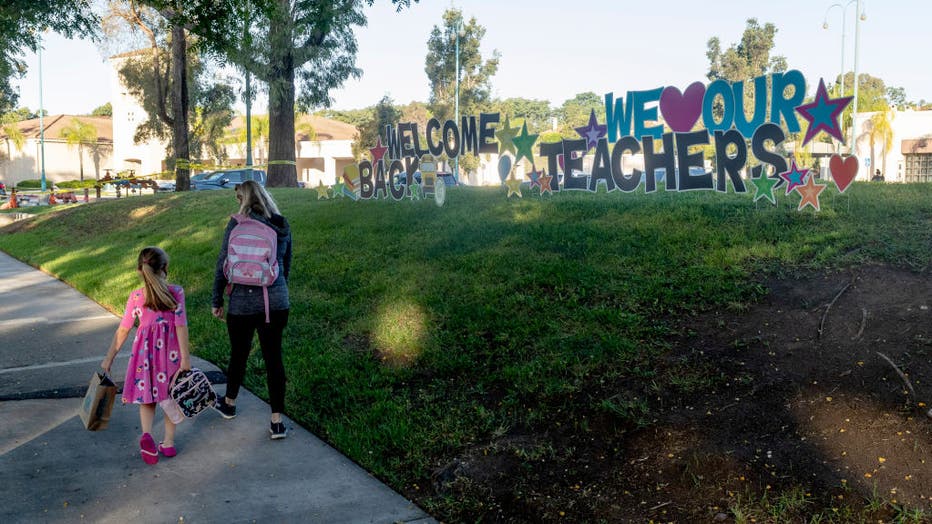Teachers, child care workers nationwide can now sign up for COVID-19 vaccine
WASHINGTON - Teachers, other school staff, and child care workers are now able to sign up to receive a COVID-19 vaccine at more than 9,000 pharmacies nationwide, regardless of whether or not their state has opened up eligibility to them yet.
President Joe Biden on Tuesday directed states to prioritize vaccinating educators over the next few weeks through the federally-run program that ships doses directly to participating pharmacies.
Biden said his goal is for every pre-kindergarten through 12th-grade educator, school staff member, and child care worker to receive at least one shot by the end of March — part of his administration’s push to reopen U.S. classrooms.
The U.S. Centers for Disease Control and Prevention added the directive to its page about the pharmacy program, which has enlisted 21 national pharmacy chains and independent pharmacy networks to increase access to COVID-19 vaccines.
Participants include major retailers like Walgreens, CVS Pharmacy, Rite Aid, Kroger, Walmart, Publix, Meijer, and Costco.
"Over 30 states have already taken steps to prioritize educators for vaccination. And today, I’m using the full authority of the federal government. I’m directing every state to do the same," Biden said.
"My challenge to all states, territories, and the District of Columbia is this: We want every educator, school staff member, child care worker to receive at least one shot by the end of the month of March," he added.

FILE - Students head to school past a welcome back sign on the first day of in-person instruction at Arroyo Vista Elementary School on Sept. 29, 2020 in Rancho Santa Margarita, California. (Photo by Paul Bersebach/MediaNews Group/Orange County Regist
The CDC said aside from teachers, state and local officials will still determine eligibility for residents based on their individual vaccination plans.
Last weekend, the U.S. further expanded its arsenal of vaccines after the Food and Drug Administration gave emergency use approval for Johnson & Johnson’s one-dose shot. The vaccine adds to the supply currently being distributed across the country by Pfizer and Moderna.
In his Tuesday briefing, Biden said he expected the country will have enough vaccines available for all U.S. adults by the end of May — two months earlier than anticipated. The president cited drugmaker Merck & Co. helping to produce rival J&J’s vaccine in an effort to greatly expand the supply more quickly.
RELATED: Official: Merck to help produce rival J&J's COVID-19 vaccine
The push to get educators vaccinated comes as both the White House and the CDC have said schools can reopen even if educators haven’t received their shot, as long as other pandemic-related safety measures are taken.
Dr. Celine Gounder, who served as a coronavirus advisor during Biden’s transition, criticized Biden’s announcement — saying "young, healthy teachers don't need to be prioritized" because schools are among the safest in-person workplaces with proper mitigation measures. Grounder also called it an "anti-equity move," saying it would make it more difficult for communities of color and those who are higher-risk to get the shot.
"If you really wanted to target the highest risk occupations, that would be farmworkers, or people working in meatpacking, food processing, or prisons. These are far riskier in-person workplaces," Grounder wrote in a Twitter thread following Biden’s announcement. "So much for valuing Black and Brown people working in critical infrastructure jobs."
When asked about Grounder’s criticism, White House press secretary Jen Psaki said they aren’t just pushing to have teachers vaccinated, but the directive also includes bus drivers, janitorial workers, and child care workers — "a workforce that is broadly, incredibly diverse."
"Getting kids back to school is one of the most equitable steps we can take because what we’ve seen statistically is that Black and Latino students are disproportionately experiencing learning loss for a variety of reasons," Psaki said, noting disparities among this group with access to the internet and parents who are disproportionately frontline workers.
"So our view is actually that this step is one that is meant to help communities of color, help students who are already being disproportionately disadvantaged by schools being closed," Psaki added.
RELATED: US states are easing COVID-19 restrictions too early, medical experts say
This story was reported from Cincinnati.

